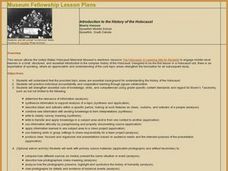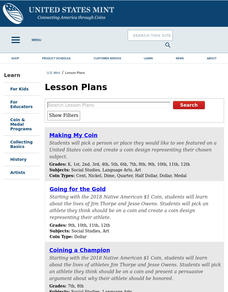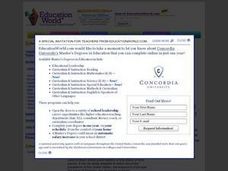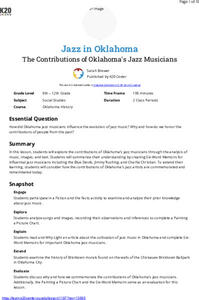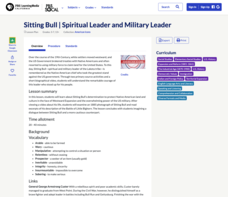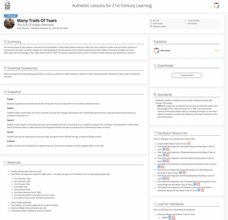Curated OER
Differences and Settlement in Framing the United States Constitution
Students identify the principles of democracy when framing the United States Constitution. In groups, they analyze the differences that were settled before anyone signed the document. They role play their own activity in which they...
City University of New York
Electoral College
A presidential election is a lot like the 2004 World Series, and it's also a lot like choosing an orange in a paper bag. Apply the process of the electoral college to these two analogies with a set of lessons about government...
Curated OER
Agriculture Shapes Kentucky History
Young scholars explore the lives of early American Indians and settlers in Kentucky. They describe the agricultural practices of Indians native to Kentucky and develop a supply list for a group of settlers coming to the state to...
Alabama Department of Archives and History
Conflict in Alabama in the 1830s: Native Americans, Settlers, and Government
To better understand the Indian Removal Act of 1830, class members examine primary source documents including letters written by Alabama governors and the Cherokee chiefs. The lesson is part of a unit on the expansion of the United...
Curated OER
Mapping Your State's Role in the Vietnam War
Students recognize reasons to celebrate Memorial Day. Students create a map of victims of the VIetnam War. Using the internet, students research information about soldiers from their state who were killd in action in Vietnam. Students...
Stanford University
Chinese Immigration and Exclusion
The Chinese Exclusion Act was the first race-based restriction on immigration in American history. Why was the act passed after Chinese immigrants helped build the Transcontinental Railroad? A series of documents, including speeches and...
Curated OER
Blasphemy! Salman Rushdie and Freedom of Expression
Learners explore the concepts of blasphemy, censorship and freedom of expression through the lens of Salman Rushdie. They also consider how these issues have been reflected in US history.
Curated OER
Introduction to the History of the Holocaust
The Holocaust is unbelievable! Examine this piece of history with your class. Using the Internet, research groups determine the relevance of information presented, compare how different sites present the same information, synthesize...
NPR
Suffrage Lesson Plan
Has life changed for American women in the last century, or are there common themes between the lives of 21st century women and the struggle of suffragettes from the 1910s? Explore the ways media reflects the position of women in the...
Curated OER
Charting History With Pennies
Students collect pennies and sort them in ascending order of dates. For the year on each penny, students research key events in history and pick a single event, explaining its historical significance. Then students use these events to...
Curated OER
Interviewing Famous Leaders in History
Students explore historical figures. In this history/research lesson, students use a variety of research materials to learn about the historical figure of their choice. Students write questions and responses as if they were interviewing...
Curated OER
A River Ran Wild: An Environmental History
The Nashua River serves as the focal point of an investigation of the treatment of and care for natural resources. A reading of A River Rand Wild: An Environmental History by Lynne Cherry, launches the study and class members consider...
Macmillan Education
Webquest: Thanksgiving
Class members use the Internet to research the history of Thanksgiving in the United States and Canada, as well as the traditions surrounding the Thanksgiving-style celebrations of the Hebrews, the Chinese, and in Ancient Greece and Rome.
Curated OER
The Changing Role of Women
Eleventh graders examine the evolution of women's rights in America. As they analyze primary documents and discuss historical events, learners determine how Abigail Adams, Eleanor Roosevelt, Lady Bird Johnson, Margaret Sanger, and James...
K20 LEARN
Government and Your Right To Vote: Voting Rights In America
Gaining voting rights was difficult over the course of decades, but the debate over who should actually be allowed to cast a ballot remains. Scholars explore the history of the struggle, including the fifteenth and nineteenth amendments,...
K20 LEARN
Jazz In Oklahoma
When considering the possible hot spots of jazz in the United States, Oklahoma isn't the state that first comes to mind. However, it is the birthplace of several jazz musicians that influenced the evolution of the genre and Oklahoma City...
Benjamin Franklin Tercentenary
What Good May I Do: Franklin and the American Civic Association
Benjamin Franklin may have been a Founding Father of the United States, but he also founded a number of civic associations. Learners explore his legacy using a biographical essay and collaborative activity. After their exploration,...
Breaking News English
More People to Stick to New Year's Resolutions
What makes a good New Year's resolution? Practice goal-setting and reading comprehension with a set of language arts activities. English learners work on cloze passages, synonym matches, interviewing exercises, and comprehension...
Curated OER
Volcanoes: Kindergarten Lesson Plans and Activities
In the pre-lab, kindergarteners mimic the movements of the eruption of a volcano and discover various volcanoes around the United States. Then, pupils sort different types of volcanic rocks in the lab before learning how volcanoes grow...
PBS
Sitting Bull: Spiritual Leader and Military Leader
Sitting Bull was not expected to be a great warrior. Yet, he led the Lakota people and other tribes to several pivotal victories against the United States government when federal troops threatened their land. Using primary sources, such...
Constitutional Rights Foundation
Why Don’t More People in the U.S. Vote?
To vote or not to vote, that is the question. Secondary scholars explore voter turnout in the United States. The resource uses informational text, group discussion, and a worksheet to help academics understand hindrances to voting and...
National Woman's History Museum
Creating a Historical Thesis Statement
A strong thesis statement not only identifies the subject of an essay but also presents a claim that must be supported with evidence. After researching how nursing has evolved in the United States since the Colonial era, young writers...
Smithsonian Institution
The Suffragist: Educator's Guide for Classroom Video
Class members take on the role of historical investigators to determine why it took 40 years for women in the United States to get the right to vote. Sleuths view videos and analyze primary sources and images to gather evidence to answer...
K20 LEARN
Many Trails of Tears: The Era of Indian Removal
Cherokee, Chickasaw, Choctaw, Creek, and Seminole. All were forced off their ancestral lands in the southeastern United States as part of the Indian Removal Act of 1830. Young historians research the tribes' reactions to this removal and...
Other popular searches
- United States History 1920s
- United States History 1900's
- United States History 1700's
- United States History Essays
- Ap United States History
- Media United States History
- United States History K 2
- History of United States
- United States History Exam
- United States History Colonial
- United States History Units
- United States History Timeline









